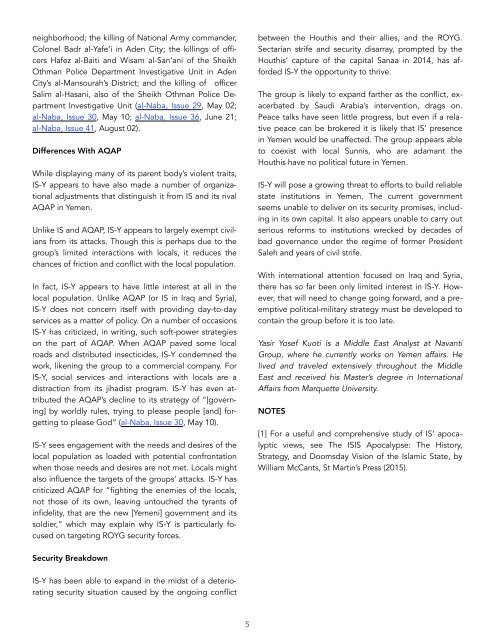You also want an ePaper? Increase the reach of your titles
YUMPU automatically turns print PDFs into web optimized ePapers that Google loves.
neighborhood; the killing of National Army commander,<br />
Colonel Badr al-Yafe’i in Aden City; the killings of officers<br />
Hafez al-Baiti and Wisam al-San’ani of the Sheikh<br />
Othman Police Department Investigative Unit in Aden<br />
City’s al-Mansourah’s District; and the killing of officer<br />
Salim al-Hasani, also of the Sheikh Othman Police Department<br />
Investigative Unit (al-Naba, Issue 29, May 02;<br />
al-Naba, Issue 30, May 10; al-Naba, Issue 36, June 21;<br />
al-Naba, Issue 41, August 02).<br />
Differences With AQAP<br />
While displaying many of its parent body’s violent traits,<br />
IS-Y appears to have also made a number of organizational<br />
adjustments that distinguish it from IS and its rival<br />
AQAP in Yemen.<br />
Unlike IS and AQAP, IS-Y appears to largely exempt civilians<br />
from its attacks. Though this is perhaps due to the<br />
group’s limited interactions with locals, it reduces the<br />
chances of friction and conflict with the local population.<br />
In fact, IS-Y appears to have little interest at all in the<br />
local population. Unlike AQAP (or IS in Iraq and Syria),<br />
IS-Y does not concern itself with providing day-to-day<br />
services as a matter of policy. On a number of occasions<br />
IS-Y has criticized, in writing, such soft-power strategies<br />
on the part of AQAP. When AQAP paved some local<br />
roads and distributed insecticides, IS-Y condemned the<br />
work, likening the group to a commercial company. For<br />
IS-Y, social services and interactions with locals are a<br />
distraction from its jihadist program. IS-Y has even attributed<br />
the AQAP’s decline to its strategy of “[governing]<br />
by worldly rules, trying to please people [and] forgetting<br />
to please God” (al-Naba, Issue 30, May 10).<br />
IS-Y sees engagement with the needs and desires of the<br />
local population as loaded with potential confrontation<br />
when those needs and desires are not met. Locals might<br />
also influence the targets of the groups’ attacks. IS-Y has<br />
criticized AQAP for “fighting the enemies of the locals,<br />
not those of its own, leaving untouched the tyrants of<br />
infidelity, that are the new [Yemeni] government and its<br />
soldier,” which may explain why IS-Y is particularly focused<br />
on targeting ROYG security forces.<br />
between the Houthis and their allies, and the ROYG.<br />
Sectarian strife and security disarray, prompted by the<br />
Houthis’ capture of the capital Sanaa in 2014, has afforded<br />
IS-Y the opportunity to thrive.<br />
The group is likely to expand farther as the conflict, exacerbated<br />
by Saudi Arabia’s intervention, drags on.<br />
Peace talks have seen little progress, but even if a relative<br />
peace can be brokered it is likely that IS’ presence<br />
in Yemen would be unaffected. The group appears able<br />
to coexist with local Sunnis, who are adamant the<br />
Houthis have no political future in Yemen.<br />
IS-Y will pose a growing threat to efforts to build reliable<br />
state institutions in Yemen. The current government<br />
seems unable to deliver on its security promises, including<br />
in its own capital. It also appears unable to carry out<br />
serious reforms to institutions wrecked by decades of<br />
bad governance under the regime of former President<br />
Saleh and years of civil strife.<br />
With international attention focused on Iraq and Syria,<br />
there has so far been only limited interest in IS-Y. However,<br />
that will need to change going forward, and a preemptive<br />
political-military strategy must be developed to<br />
contain the group before it is too late.<br />
Yasir Yosef Kuoti is a Middle East Analyst at Navanti<br />
Group, where he currently works on Yemen affairs. He<br />
lived and traveled extensively throughout the Middle<br />
East and received his Master’s degree in International<br />
Affairs from Marquette University.<br />
NOTES<br />
[1] For a useful and comprehensive study of IS’ apocalyptic<br />
views, see The ISIS Apocalypse: The History,<br />
Strategy, and Doomsday Vision of the <strong>Islamic</strong> State, by<br />
William McCants, St Martin’s Press (2015).<br />
Security Breakdown<br />
IS-Y has been able to expand in the midst of a deteriorating<br />
security situation caused by the ongoing conflict<br />
5








